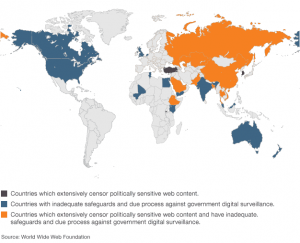 Last week, Sir Tim Berners-Lee, founder of the World Wide Web Foundation, warned that the Internet is threatened by a growing tide of surveillance and censorship. In the Foundation’s annual Web Index Report, it was reported that, “…94% of countries in the Index do not meet best practice standards for checks and balances on government interception of electronic communications.” They also report that moderate to extensive blocking or filtering of politically sensitive content takes place in 30 percent of Index countries.
Last week, Sir Tim Berners-Lee, founder of the World Wide Web Foundation, warned that the Internet is threatened by a growing tide of surveillance and censorship. In the Foundation’s annual Web Index Report, it was reported that, “…94% of countries in the Index do not meet best practice standards for checks and balances on government interception of electronic communications.” They also report that moderate to extensive blocking or filtering of politically sensitive content takes place in 30 percent of Index countries.
These are alarming statistics but the report also showed that social media is having a very positive effect. In 80% of the countries in the Index, the Web and social media played a role in public mobilization and half the time, were a major catalyst. The Web certainly cuts both ways.
The Web is a catalyst for change
No one doubts that the Internet has been a catalyst for change in the way people, business and government see each other. Just last year we watched the Arab Spring rely heavily on the Internet for its momentum and we saw the revelations made by Edward Snowden about NSA surveillance. We’ve watched businesses gradually become better and better at knowing who we are and personalizing the way they interact with us, but we’ve also watched bullying and other terrible behaviors enabled by the same medium.
The truth is that the Internet has had a profound effect in both good and bad ways. The table below is a simple version of what is in reality a complex and profound change brought on by the Web:
 The Internet will continue to disrupt people, business and government as its effects become more amplified with the spread of Web technology across a greater part of the world. Are we at a point where putting safeguards in place is necessary or should the Web continue to grow, spread and mature without outside interference? The Foundation thinks it is time to act and recommends the following:
The Internet will continue to disrupt people, business and government as its effects become more amplified with the spread of Web technology across a greater part of the world. Are we at a point where putting safeguards in place is necessary or should the Web continue to grow, spread and mature without outside interference? The Foundation thinks it is time to act and recommends the following:
- Reverse the rising tide of online censorship and surveillance.
- Make broadband affordable and accessible to all.
- Guarantee that all women, men, girls and boys can access essential information.
- Educate everyone on digital rights and skills.
These are the key questions of our times and will affect the majority of the planet over the next twenty years. Take the time to read the full report.
For other write ups on the theme of privacy, see:
- How much should we really expect privacy?
- Snowden told us things we should have already known
- Do we have a right to be forgotten?
- Thin walls and traffic cameras
- A penny for your privacy?




 All Things D
All Things D ARS Technica
ARS Technica Engadget
Engadget GigaOM
GigaOM Mashable
Mashable TechCrunch
TechCrunch The Verge
The Verge Venture Beat
Venture Beat Wired
Wired Chris Brogan
Chris Brogan Brian Solis
Brian Solis Chris Dixon
Chris Dixon Clay Shirky Blog
Clay Shirky Blog HBR Blog
HBR Blog IT Redux
IT Redux Jeremiah Owyang
Jeremiah Owyang Radar O'Reilly
Radar O'Reilly Seth Godin Blog
Seth Godin Blog SocialMedia Today
SocialMedia Today Solve for Interesting
Solve for Interesting The TIBCO Blog
The TIBCO Blog Lifehacker
Lifehacker
